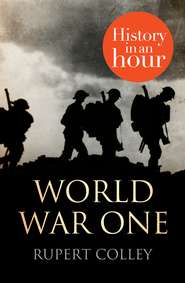скачать книгу бесплатно
In October 1914, Turkey (the Ottoman Empire) entered the war on the side of the Central Powers and on Christmas Day went on the offensive against the Russians, launching an attack through the Caucasus. The Tsar sent an appeal to Britain, asking for a diversionary attack that would ease the pressure on Russia. In the event, the Turks failed miserably in its first campaign in Russia, losing 70 per cent, dead or wounded, of an army estimated to be at least 100,000 strong. Enver Pasha blamed Turkey’s defeat on Armenian deserters who had gone over to the Russian side. Retribution was brutal, resulting in the Armenian massacre, sometimes considered the first genocide, in which Armenians were deported to Syria. Famine, disease and murder resulted in one to two million Armenian deaths.
The British pressed on with its plan for a diversionary attack, to use the Royal Navy to take control of the Dardanelles Straits from where they could attack Constantinople, the Ottoman capital. The Dardanelles, a strait of water separating mainland Turkey and the Gallipoli peninsula, is 60 miles long and, at its widest, only 3.5 miles. Britain’s First Lord of the Admiralty, Winston Churchill, insisted that the Royal Navy, acting alone, could succeed. On 19 February, a flotilla of British and French ships pounded the outer forts of the Dardanelles and a month later attempted to penetrate the strait. It failed, losing six ships, half its fleet. Soldiers, it was decided, would be needed after all.
Lord Kitchener placed in charge Sir Ian Hamilton, but sent him into battle with out-of-date maps, inaccurate information and inexperienced troops. A force of British, French and ANZAC (Australian and New Zealand Army Corp) troops landed on the Gallipoli peninsula on 25 April. The Turks were waiting for them in the hills above the beaches and unleashed a volley of fire that kept the Allied troops pinned down on the sand. As on the Western Front, stalemate ensued. The Allies, under constant attack, took cover as best as they could among the rocks, with only the beach behind them and, without shade, exposed to searing sun. Their fallen comrades lay putrefied and bloated beside them, the stench filling the air.
Australian artillery during the Gallipoli Campaign, 1915
On 6 August, the British launched a renewed attack. The ANZACs would attempt to break out from their beach and take the high ground whilst a British contingent of 20,000 new troops led by General Sir Frederick Stopford would land on Sulva Bay on the north side of Gallipoli. Stopford’s men made a successful landing, outnumbering the enemy by fifteen to one. Instead of pressing home their advantage, the general gave his men the afternoon off to enjoy the sun while he had a snooze. Hamilton advised but did not order an advance. By the time Stopford did advance, it was too late, the Turks had rushed men into position and the stalemate of before prevailed.
Вы ознакомились с фрагментом книги.
Для бесплатного чтения открыта только часть текста.
Приобретайте полный текст книги у нашего партнера:
